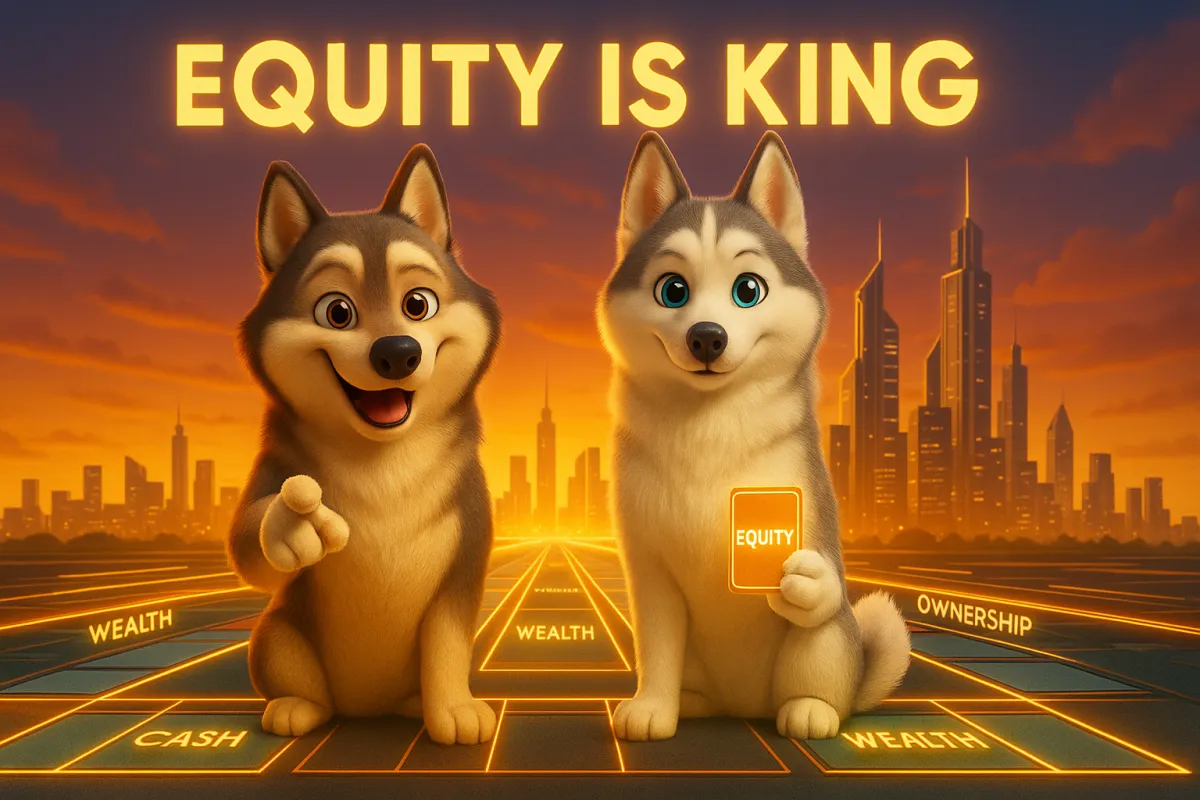Greetings
interested in learning more?
Book a call and we will happily take 15min to pass on the knowledge. We are an open book, proud to help all other real estate players build wealth
Want to hear more?
Let's Collaborate


Send a Message Instead
we'd love to hear from you

Monopoly's Hidden Lesson: The Real Estate Game You Were Never Taught
That famous board game with the little metal top hat and colorful money wasn't created to celebrate getting rich while bankrupting your friends and family. In fact, Monopoly began as something radically different.
The iconic game originated as "The Landlord's Game," designed by Elizabeth Magie in 1904 to demonstrate the dangers of wealth concentration and to employ everyone to find more equitable economic systems. This wasn't just entertainment—it was educational propaganda meant to illustrate how unfair economic systems can become.
The history of this household staple reveals something profound about our relationship with wealth, property, and fairness—lessons that remain relevant in today's real estate market.
The Game With Two Sets of Rules
What most people don't realize is that Magie created a distinct sets of rules for her game. The first game—the "anti-monopolist" rules—eventually became the modern captilist game we all know, where players crush opponents through aggressive wealth accumulation.
But there was a second set of rules.
These "anti-monopolist" or "Prosperity" rules created a system where wealth was shared and all players benefited when anyone created value—exactly the type of system that could create more stability in real estate markets today.
This forgotten version of the game demonstrated how an alternative system could create more balanced wealth distribution among all participants, making it one of the first interactive simulations designed to teach economic principles.
Shane Walsh, founder of WealthTradie, sees parallels between these forgotten rules and what's possible in today's real estate market.
Real Estate Wealth: Beyond Cash Transactions
The conventional real estate game operates much like modern Monopoly—cash-rich players accumulate properties while everyone else pays rent until they're eliminated. But Walsh recognized a fundamental problem with this system from his 23 years in construction and 10 years in real estate investing.
"Contractors provide immense value through their craftsmanship and labor, but traditionally receive only cash compensation rather than building equity," Walsh explains in his book The Real Game Made Simple: Real Estate Made Simple.
This insight led to the development of Home Equity Invoice Agreements (HEIA), which transform standard monetary construction invoices into property equity percentages. This innovation allows homeowners and investors to utilize their property's equity without banks or lenders as intermediaries—saving on origination fees and interest rates.
The approach mirrors the "Prosperity" rules of the original Landlord's Game, where value creation benefits all participants rather than concentrating wealth in the hands of a few.
The Three Pillars of Real Estate Wealth
Understanding real wealth in real estate requires looking beyond cash flow to three fundamental pillars:
1. Appreciation - Property values typically increase over time, building wealth through market growth. Unlike cash, which loses value through inflation, real estate often appreciates faster than inflation rates.
2. Positive Depreciation - While accountants calculate depreciation as a loss in value, real estate investors can use this "paper loss" to offset income for tax purposes—even while the property itself gains market value. Along with utlizing other strategies of having rental income pay down your leveraged dept against the property.
3. Tax Incentives - The tax code provides numerous advantages for real estate investors, from mortgage interest deductions to 1031 exchanges that defer capital gains taxes when upgrading properties. Or just capital gains alone being taxed less then ordinary income.
These pillars represent the true game of wealth building that most people never learn to play.
Redistributing Wealth Through Equity
The original Monopoly game demonstrated how rents enrich property owners and impoverish tenants. But it also showed that an alternative system could create more balanced wealth distribution among all participants.
WealthTradie's Home Equity Invoice Agreements operate on a similar principle. By converting labor and materials into equity positions, contractors can participate in the appreciation of properties they improve rather than merely receiving one-time cash payments.
"The construction industry has operated the same way for generations," Walsh notes. "Contractors provide immense value but rarely build wealth proportionate to their contribution. HEIA changes that equation."
This approach doesn't require contractors to learn new skills or change their business model—they simply need to understand how to structure contracts as agreements that capture the true value of their work.
From Game Theory to Real-World Application
The principles behind both the original Landlord's Game and WealthTradie's approach can be seen in action through practical examples.
Consider a small renovation that costs $30,000 in labor and materials. In the traditional model, the contractor receives $30,000 plus 50% profit margins, while the homeowner captures all future appreciation from the improvement.
With a Home Equity Invoice Agreement, that same work might convert to a 5% equity stake in the property. If the home later sells for $100,000 above purchase price, the contractor receives $5,000 in addition to their initial payment—participating in the wealth creation their work helped generate.
Walsh demonstrates these concepts in detail in his educational video:
Changing the Rules of the Game
Elizabeth Magie created her board game to teach economic principles to people of all ages. Similarly, WealthTradie aims to educate contractors, homeowners, investors, and real estate professionals about more equitable ways to structure their business relationships.
The goal isn't to overthrow capitalism but to create a more balanced system where those who create value receive fair compensation for their contributions—not just in immediate cash but in long-term wealth building.
Just as Monopoly's original "Prosperity" rules showed how all players could benefit from property development, Home Equity Invoice Agreements demonstrate how contractors can participate in the wealth they help create without requiring homeowners to sacrifice liquidity.
Learning to Play a Different Game
Most people play Monopoly without ever learning about its educational origins or alternative ruleset. Similarly, many contractors, homeowners, and investors operate in the real estate market without understanding the full range of possibilities for structuring their agreements without third party banks or lenders controlling them.
WealthTradie's mission centers on teaching people to play a different game—one where quality work receives fair compensation tied to actual property values rather than arbitrary hourly rates or inflated fixed bids.
By standardizing quality assessments and creating transparent equity agreements, all parties can benefit from the true value creation that occurs when properties are improved.
The real game of wealth building isn't about collecting the most cash—it's about understanding how equity, appreciation, and tax incentives combine to create lasting financial security.
Just as Monopoly's creator hoped to teach economic principles through play, WealthTradie aims to educate the real estate industry about more equitable ways to distribute the wealth that construction and property improvement naturally generate.
The rules of the game are changing. The question is: are you ready to play?
WealthTradie
Homeowners
Contractors
HEIA Liaisons
NEWS
Login

Shane Walsh - Founder
Has deeply rooted experience in the construction industry, real estate investing, and creative financing. Growing up in a family construction business, serving in the Marine Corps, and successfully starting a fix-and-flip business, he discovered the power of Equity Invoice Contracts. My mission is to share this innovative approach with contractors, investors, and real estate professionals to ensure quality, accountability, and financial stability in property renovations.
(620)-837-8489.

Veteran Founded
Terms & Conditions | Privacy Policy
© 2025 WealthTradie - All rights reserved

